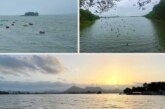Scores of amateur writers describe the arrival of new season in fields and gardens

Some wrote in praise of the signs of spring glimpsed through windows or from balconies while others focused on the birds, the bees and the unfurling leaves spotted during outings for permitted exercise.
Scores of amateur authors have taken part in a spring nature diary project to document the early days of the new season, with most clearly taking solace and finding some hope in flora and fauna at this most challenging of times.
The 150-word pieces were collected by the Arts and Humanities Research Council, the National Trust and the Land Lines research project, which is investigating the history of nature writing in the UK.
People of all ages submitted entries from towns, cities and villages. There are recurring themes – the joy of birdsong, the pleasure of a surprise encounter with a frog, butterfly or deer. There are vivid descriptions of kingfishers, of soaring birds of prey and paths flanked by wild garlic.
Julian Gurney from Devon chose to focus on the “Optimistic Oak” near his home, explaining: “Its leaf buds are cracking open, showing a hint of green, whilst all the other trees, in the wood across the combe, hold their leaves tightly wrapped in their dark winter coats.”
Londoner Cornelia Prior wrote about an urban animal preparing its spring den: “In the garden of the next door block, a fox makes its earth ready for cubbing. Confined to their houses, people lucky enough to have roofs or balconies stretch out on them like cats.”
Of course, sadness at the chaos and heartache the pandemic has created also haunts the pieces. Su Corcoran of Greater Manchester contributed: “Birds are my only physically present company in the first week of Covid-19-related isolation.”
The published pieces were selected by Pippa Marland from the Land Lines research project at Leeds University, who said the entrants joined a long line of authors celebrating the arrival of spring.
She said: “From Dorothy Wordsworth and Gilbert White to Derek Jarman and Melissa Harrison, nature diarists have evoked the special qualities of this season – the sense of anticipation it instils, as well as the sheer joy of witnessing new life.

“The entries show that our collective relationship with nature is not simply a form of escapism – it’s also a means of fathoming out meaning, of coming to some kind of understanding of the current crisis and of what it means to live as part of nature.”
The Cornish nature writer Natasha Carthew went through the entries and used them as inspiration for a story of her own, Hope’s Heart Beats.
She said the pieces made her feel optimistic: “I absolutely loved weaving the different nature observations into the story. Each diary entry was like a found object gifted from folk all over the country.”
Extracts from the entries
My son, so much lower than me, stroked the star-shaped moss. We were still laughing at the mud when the green of a dip stopped us; everywhere, green. He said it was a place for dinosaurs, then I heard it, and we all stood stretching out our ears until it broke again: the purr of beak against wood. ‘I’ve never heard a woodpecker before,’ I whispered, and he shouted ‘Me neither!’ and ran off with a stick older than him, and I hoped that this is the thing he remembers about being five.
Katharine Earnshaw, Devon
The weather skips from rain, wind, frost to sun, blue sky and warmth. An unusual sparrow hawk flies low across the sky, high above us buzzards circling gardens on heated air.
Edith Shergold, aged nine, Gloucestershire
You crept in after the floods and waited until the wind blew cold across the worn-out river. The magnolias amid the molehills in the cemetery welcome you with a wild display of lightbulbs. Let’s bury the winter under a canopy of tearful petals.
William Bartlett, Cardiff
From troubles of the world, I turn to ducks. That’s what my grandma used to say. It’s from a FW Harvey poem. But I’m reminded of it every time I slurp tea from the mug I have that’s covered in pictures of different species of duck. The poem seems fitting today: the world is in limbo but nature is still there, soothing, calming.
Sally R, Bristol



